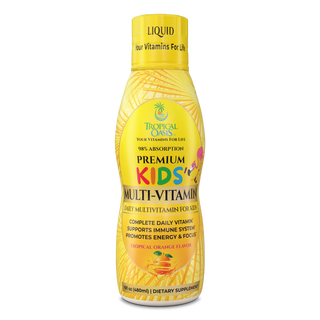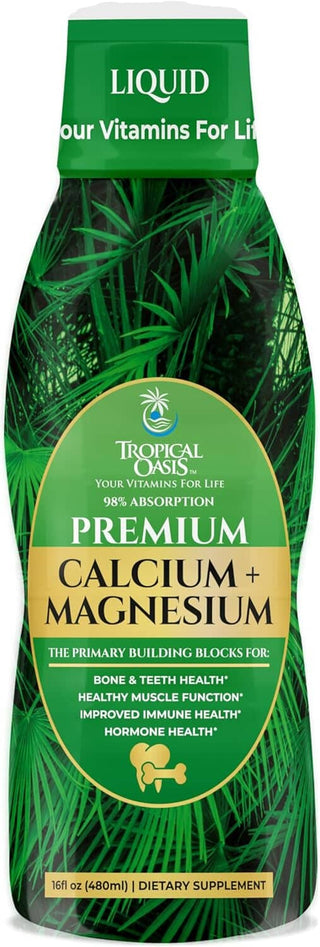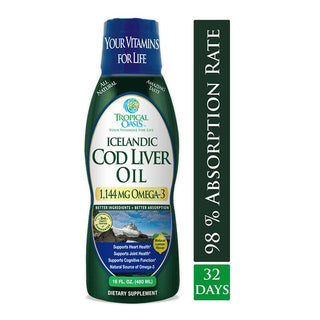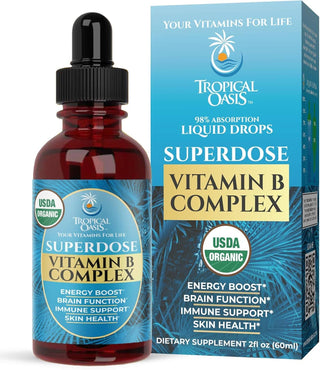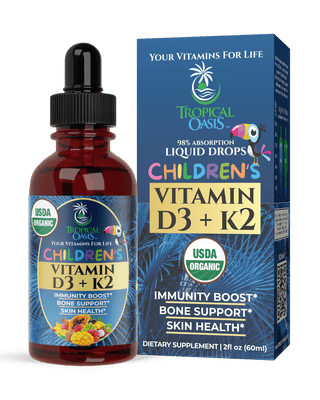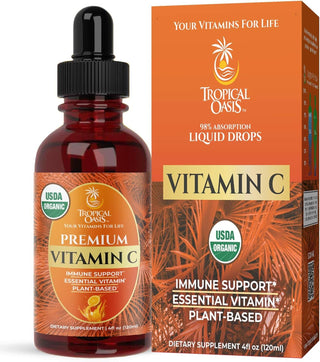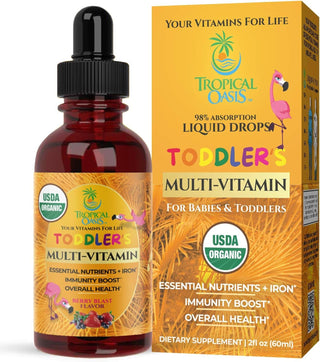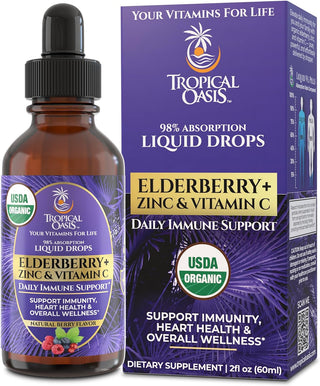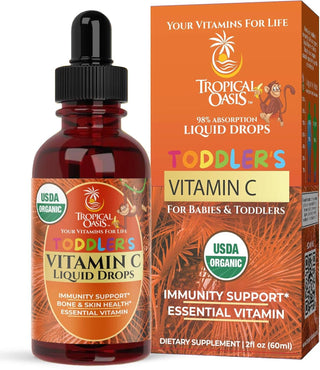Liquid Vitamins for Kids
Organic Liquid Vitamin Elderberry Drops with Vitamin C and Zinc for Adults & Kids
Regular price
$24.95
$19.96
- Unit price
- /per
Organic Liquid Vitamin Elderberry Drops for Toddlers & Kids
Regular price
$24.95
$19.96
- Unit price
- /per
You’re viewing 1-11 of 11 products
Frequently Asked Questions
Liquid vitamins for kids are dietary supplements in liquid form, designed to provide essential nutrients that may be missing from a child's diet. They work by delivering vitamins and minerals in a form that is easy to consume, especially for young children who may have difficulty swallowing pills or dislike certain chewable options.
Liquid vitamins are absorbed faster than capsules or tablets because they don’t need to be broken down by the digestive system first. This can lead to higher bioavailability, meaning more of the vitamin’s nutrients are absorbed into the bloodstream, providing effective support for growth, development, and overall health.
Choosing liquid vitamins over gummies or pills can offer several advantages for children. First, liquid vitamins are often easier for kids to consume, especially for toddlers or younger children who may struggle with swallowing pills or may be selective with chewable forms.
Liquid vitamins also typically avoid the added sugars, artificial colors, and flavorings found in many gummy vitamins, which can be beneficial for parents looking to limit these ingredients. Additionally, because liquid vitamins bypass the breakdown process that pills require, they’re often absorbed more efficiently, ensuring children get the maximum nutritional benefit from each dose.
A quality children’s liquid multivitamin should include a balanced selection of essential vitamins and minerals to support growth, immune function, brain development, and overall well-being. Here’s a closer look at the key nutrients often included in these multivitamins:
Vitamin A
This vitamin is crucial for healthy vision, particularly in low-light conditions, and supports the immune system by aiding in the development of white blood cells. It also plays a role in maintaining healthy skin and tissues, helping to protect against infections.
Vitamin C
Known for its powerful antioxidant properties, vitamin C supports the immune system by helping the body produce white blood cells to combat illness. It also aids in collagen production, which is important for healthy skin, gums, and wound healing.
Vitamin D
Essential for bone health, vitamin D facilitates the absorption of calcium in the body, which is necessary for building strong bones and teeth. Additionally, vitamin D supports immune health, helping to protect children from colds and other infections.
Vitamin E
Another antioxidant, vitamin E helps protect cells from damage by neutralizing free radicals. It is essential for maintaining healthy skin and eyes, and it also plays a role in immune function and cellular repair.
B Vitamins (B1, B2, B3, B6, B12, Folate, And Biotin)
The B vitamins are vital for energy production, as they help convert carbohydrates into fuel for the body. They also support brain function, enhancing concentration and memory, and play a role in red blood cell formation and cellular health.
Calcium And Magnesium
Calcium is a building block for bones and teeth, necessary for the growth and development of a strong skeletal structure. Magnesium works alongside calcium, aiding in bone mineralization, muscle relaxation, and overall nervous system support.
Zinc
Zinc is essential for immune function, aiding in the production of white blood cells that fight infection. It also supports growth and development, particularly during childhood and adolescence, as it’s required for DNA synthesis and cell division.
Calcium and magnesium are vital minerals that work together to support bone health in children. Calcium is essential for building and maintaining strong bones and teeth, especially during the rapid growth phases of childhood. Without enough calcium, bones may not develop to their full density, which can impact bone health in adulthood.
Magnesium plays a complementary role by helping the body effectively utilize calcium. It assists in transporting calcium into the bones and regulating calcium levels, which supports both bone structure and muscle function. Together, these minerals help ensure that children develop strong, healthy bones and teeth, setting the foundation for long-term skeletal health.
To ensure your child receives high-quality, organic ingredients in liquid vitamins, look for products that meet the following criteria:
Certified Organic
Certifications like USDA Organic indicate that the product is made with ingredients grown without synthetic pesticides, herbicides, or GMOs, ensuring a cleaner, more natural supplement. These certifications also reflect sustainable farming practices, supporting a healthier environment.
Third-Party Testing
Brands that use third-party testing demonstrate a commitment to quality by verifying the purity, potency, and safety of their ingredients. This independent verification provides an extra level of assurance that the vitamins contain what they claim, without contaminants or impurities.
Free From Artificial Additives
High-quality liquid vitamins should ideally be free from artificial colors, flavors, and preservatives, which may be unnecessary or even harmful for young children. Natural formulations minimize the intake of chemicals, focusing on providing the purest form of nutrition.
Non-GMO And Allergen-Free
For children with food sensitivities or allergies, choosing non-GMO and allergen-free products can be crucial. Labels indicating they are free from gluten, dairy, soy, and other common allergens ensure a safer option that caters to children’s diverse dietary needs.
Transparent Ingredient Sourcing
Brands that are transparent about where their ingredients come from and how they are processed build trust with consumers. Knowing the origin and quality of each ingredient allows parents to feel more confident in the product’s safety and effectiveness.
Tropical Oasis offers a variety of liquid supplements specifically formulated for children’s health, designed to support growth, immunity, bone health, and overall well-being. Here’s a breakdown of their key products:
- Children's Premium Multiple Vitamin with Minerals: This comprehensive multivitamin provides a full spectrum of essential vitamins and minerals needed for children’s growth and development. It covers fundamental nutrients that support everything from immune health to brain function, ensuring children get balanced nutrition even if they are picky eaters.
- Calcium & Magnesium Supplement: This liquid supplement combines calcium and magnesium, two minerals crucial for bone and tooth strength. The liquid formula aids in easier absorption, allowing children to receive the full benefits of these minerals, which support healthy growth and prevent deficiencies as their bones develop.
- Cod Liver Oil: Rich in omega-3 fatty acids and vitamins A and D, this supplement supports brain health, eye development, and immune function. Cod liver oil is especially beneficial for young children, as omega-3s play a vital role in cognitive development, helping with focus and memory retention.
- Vitamin D3 + K2 Drops for Kids: Vitamin D3 enhances calcium absorption for stronger bones, while K2 directs calcium to the bones and away from soft tissues, promoting optimal skeletal health. This combination also supports immune function, providing protection against common illnesses while promoting bone density.
- Organic Vitamin B Complex Liquid Drops: This B vitamin complex includes essential B vitamins like B6, B12, and folate that aid in energy production, cognitive development, and nerve health. The organic formulation provides these important nutrients without synthetic additives, catering to children’s metabolic and mental needs.
- Organic Toddler Vitamin C Drops: Specially formulated for toddlers, these drops offer a gentle, organic source of vitamin C to support immune health. Vitamin C is also a powerful antioxidant, helping to protect growing cells from damage and supporting skin health and healing.
These products provide a range of targeted support, making it easier for parents to address their child’s specific nutritional needs with high-quality, easy-to-take liquid vitamins.
Are Liquid Vitamins Safe For Children With Allergies Or Sensitivities?
Liquid vitamins can be a suitable option for children with allergies or food sensitivities, provided parents choose the right product. Many liquid vitamins are formulated to be allergen-free, catering to children with specific dietary restrictions. Here’s what to look for to ensure safety:
Read Labels Carefully
Look for certifications that indicate the product is free from common allergens like gluten, dairy, soy, nuts, and eggs. Some brands also offer non-GMO formulations, which can be beneficial for children with sensitivities.
Check For Artificial Ingredients
Avoid liquid vitamins that contain artificial colors, flavors, or preservatives, as these may trigger adverse reactions in sensitive children.
Opt For Organic Products
Organic liquid vitamins are often a safer choice as they are made from high-quality, natural ingredients and are less likely to contain harmful pesticides or chemicals.
Consult With A Pediatrician
Always consult your child’s healthcare provider before introducing any supplement, especially if your child has known allergies or sensitivities. They can recommend specific brands or formulations tailored to your child’s needs.
What Age Groups Benefit Most From Liquid Vitamins?
Liquid vitamins are versatile and can cater to a wide range of age groups, from infants to older children. However, the specific benefits and suitability vary depending on a child’s developmental stage:
Infants (0–12 Months)
- Liquid vitamins are ideal for infants who may require additional supplementation, such as vitamin D, if they are breastfed or not consuming fortified formula.
- Products designed for infants are often in dropper form, ensuring precise dosages for their tiny nutritional needs.
Toddlers (1–3 Years)
- During this stage, rapid growth and development demand adequate nutrients. Liquid vitamins can supplement diets for picky eaters or children transitioning from formula to solids.
- Key nutrients for toddlers include calcium, vitamin D, and iron, often found in liquid multivitamins.
Preschoolers (4–5 Years)
- Liquid vitamins support brain development, immunity, and bone growth as children start school and become more exposed to germs and cognitive challenges.
- B vitamins and omega-3 fatty acids are particularly important at this age.
School-Age Children (6–12 Years)
- For older children, liquid vitamins can help fill nutritional gaps caused by busy schedules, selective eating, or increased activity levels.
- Focus on nutrients like zinc, magnesium, and vitamin C to support immunity and energy levels during this active phase.
Adolescents (13–18 Years)
- While most teens can transition to capsules or gummies, some may still benefit from liquid vitamins, especially if they have difficulty swallowing pills or have specific deficiencies.
- Key nutrients for teens include iron, calcium, and vitamin D to support growth spurts and hormonal changes.
Liquid vitamins are particularly beneficial for younger age groups or children with specific dietary challenges. Tailoring the choice to your child’s age and nutritional needs ensures they receive optimal support for their growth and development.
Can Liquid Vitamins Help Support Picky Eaters?
Yes, liquid vitamins can be an effective solution for supporting picky eaters, who may not get all the nutrients they need from food alone. Here’s how liquid vitamins address the challenges posed by selective eating habits:
Easy To Consume
Liquid vitamins are easier to administer than pills or capsules, especially for children who refuse certain textures or forms of supplements.
Covering Nutritional Gaps
Picky eaters often avoid entire food groups, such as vegetables or dairy, leading to nutrient deficiencies. Liquid multivitamins can provide essential nutrients like vitamin A, calcium, and iron to compensate for these gaps.
Customizable Dosing
Liquid vitamins allow for precise dosing, which is helpful when addressing specific nutritional deficiencies or adjusting to a child’s changing dietary patterns.
No Artificial Additives
Many high-quality liquid vitamins are free from artificial colors, flavors, and sweeteners, which may appeal to parents concerned about their child’s sensitivity to additives.
Improving Appetite And Energy
Certain nutrients in liquid vitamins, such as zinc and B vitamins, can help boost appetite and improve energy levels, encouraging more balanced eating habits over time.
Reduces Mealtime Stress
Knowing their child is getting essential nutrients through a supplement can alleviate parental stress and reduce the pressure to force food consumption during meals.
How Should Liquid Vitamins Be Stored And Administered?
Proper storage and administration of liquid vitamins are crucial to maintaining their potency and ensuring children receive the full nutritional benefits. Here’s a guide to help parents manage liquid vitamins effectively:
Storage Guidelines
- Follow Manufacturer Instructions: Always check the label for specific storage recommendations, as some liquid vitamins may require refrigeration after opening.
- Avoid Extreme Temperatures: Store the vitamins in a cool, dry place away from direct sunlight or heat, which can degrade their effectiveness.
- Seal Properly: Ensure the bottle is tightly sealed after each use to prevent contamination or spoilage.
Shelf Life and Expiry Dates
- Monitor Expiry Dates: Liquid vitamins often have a shorter shelf life compared to pills, so regularly check expiration dates to ensure potency.
- Discard Old Products: Avoid using vitamins that appear discolored, separated, or have an unusual smell, as these may indicate spoilage.
Administering Liquid Vitamins
- Use a Dropper or Measuring Tool: Many liquid vitamins come with a calibrated dropper or cup for accurate dosing. Avoid guessing the amount.
- Mix with Food or Drinks: To improve taste, mix the liquid vitamins into your child’s favorite juice, milk, or smoothie. Ensure the mixture is consumed fully to get the correct dose.
Establish a Routine
- Consistent Timing: Give the vitamins at the same time each day, such as during breakfast, to build a consistent routine.
- Explain the Benefits: For older children, explaining how the vitamins help them grow and stay healthy can encourage cooperation.
Safety Tips
- Keep Out of Reach: Store the bottle in a safe place to prevent accidental overconsumption.
- Consult a Doctor: Before starting any supplement, consult with a pediatrician for proper dosing based on your child’s age and specific needs.
By following these steps, parents can maximize the effectiveness of liquid vitamins and ensure their children receive safe and reliable nutritional support.

